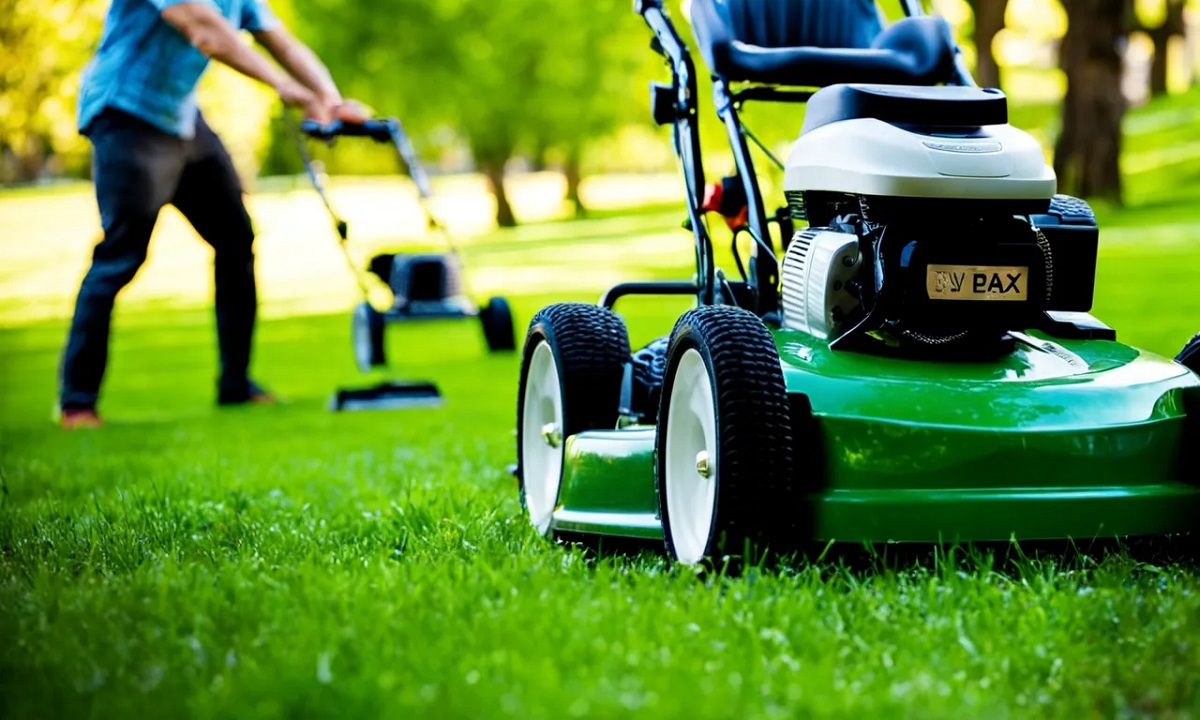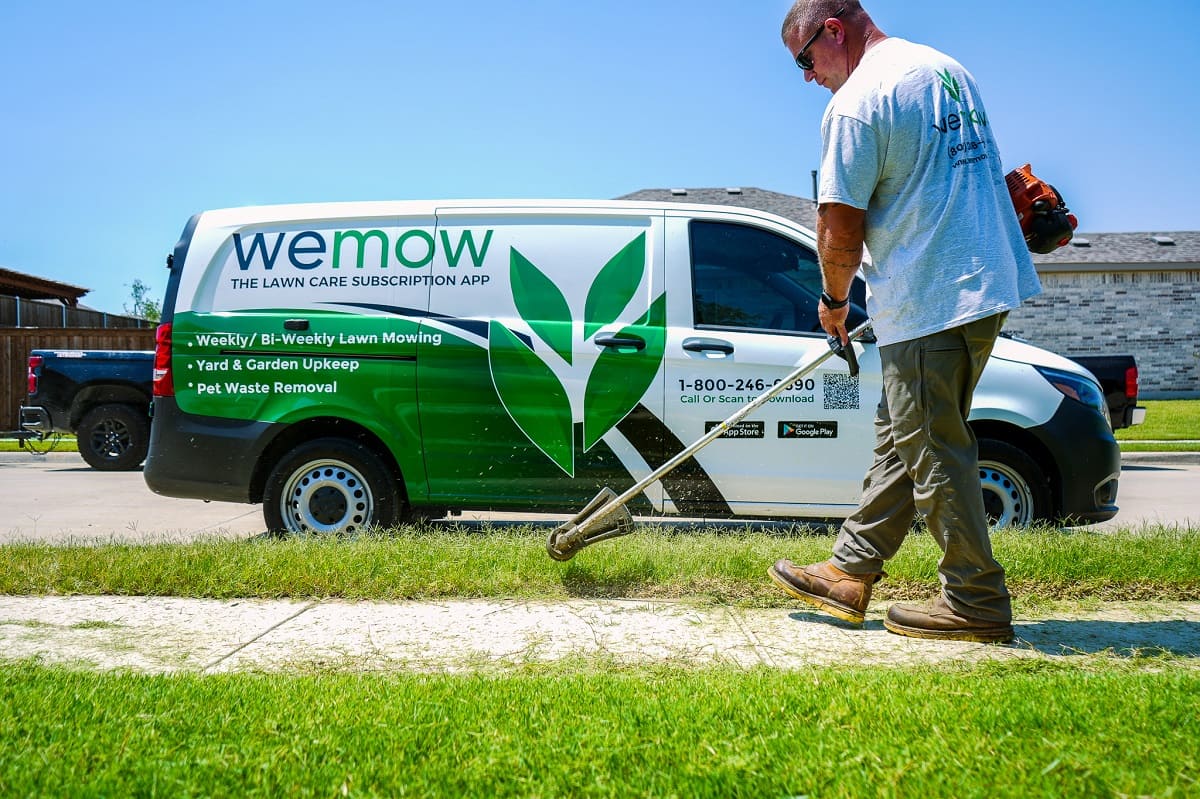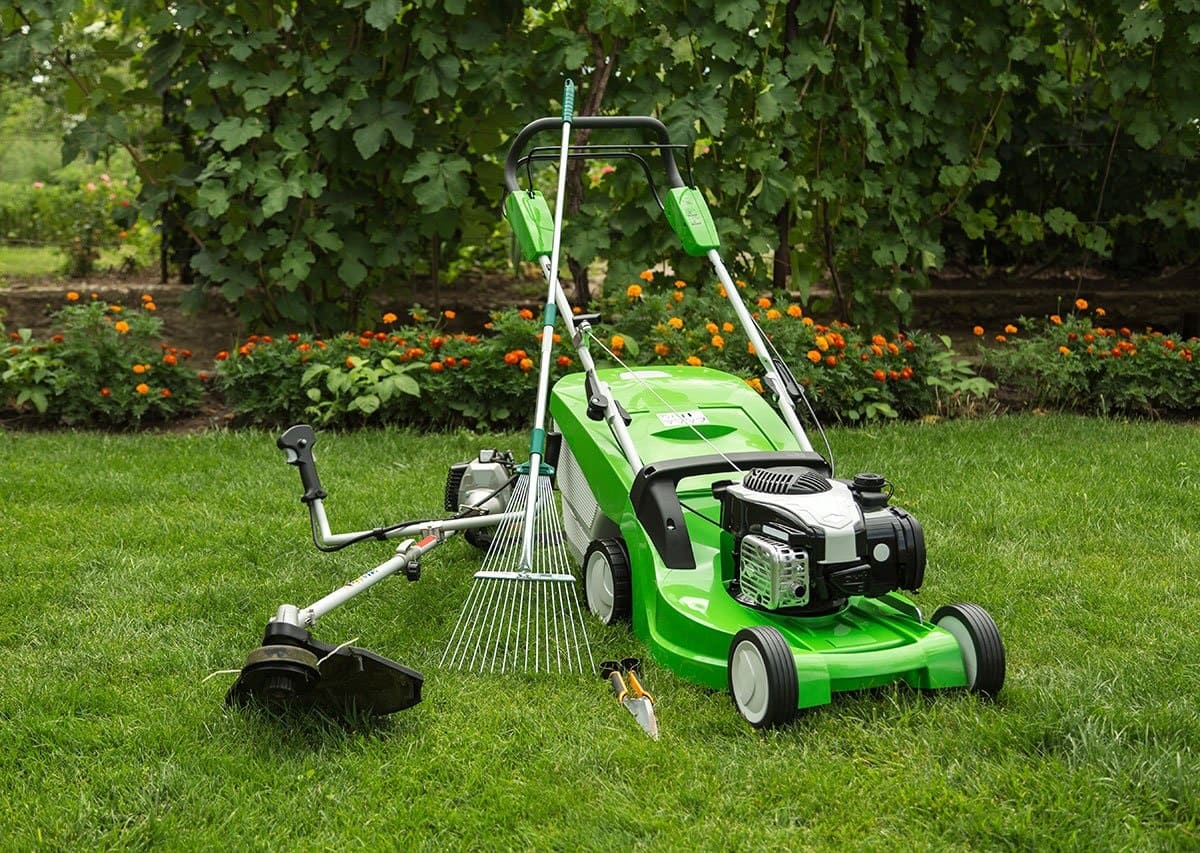Home>Garden Essentials>What Deductions Can You Claim For A Lawn Care Business


Garden Essentials
What Deductions Can You Claim For A Lawn Care Business
Modified: August 24, 2024
Discover the valuable deductions you can claim for your garden care business. Maximize your tax savings and grow your business with these expert tips.
(Many of the links in this article redirect to a specific reviewed product. Your purchase of these products through affiliate links helps to generate commission for Storables.com, at no extra cost. Learn more)
Introduction
Welcome to the world of lawn care business! Running a lawn care business can be a rewarding and profitable venture. As a business owner, it is important to understand the various deductions you can claim to minimize your tax liability and maximize your profits. By taking advantage of these deductions, you can keep more money in your pocket and grow your business.
When it comes to deductions, it’s important to have a clear understanding of what expenses can be claimed and how they can benefit your business. This article will guide you through the different types of deductions that are available for a lawn care business, helping you make informed financial decisions and optimize your tax strategy.
From start-up costs to operating expenses, vehicle expenses to home office expenses, we will cover a range of deductions that are relevant to running a lawn care business. By carefully analyzing and recording your expenses, you can ensure that you are taking advantage of every deduction that is available to you.
Before we dive into the details of deductions, remember that the information provided in this article is for general guidance purposes only. It is always recommended to consult with a tax professional or accountant who can provide personalized advice based on your specific situation.
Now, let’s explore the different deductions you can claim for your lawn care business and learn how they can positively impact your bottom line!
Key Takeaways:
- Deductions for a lawn care business include expenses for equipment, vehicle, home office, and employee wages. Keeping detailed records and consulting a professional can help maximize tax benefits.
- Prioritizing safety and health expenses, such as training, protective gear, and insurance, can contribute to a positive work environment and reduce taxable income for a lawn care business.
Understanding Deductions for a Lawn Care Business
When it comes to running a lawn care business, understanding tax deductions is essential for optimizing your financial success. Deductions allow you to reduce your taxable income and lower the amount of tax you owe. By claiming eligible expenses, you can keep more of your hard-earned money in your pocket, allowing you to invest in your business and achieve long-term growth.
Here are some key points to keep in mind when it comes to understanding deductions for your lawn care business:
- Eligible Deductible Expenses: Certain expenses incurred in the course of operating your lawn care business can be considered deductible. These typically include costs related to business operations, such as equipment, tools, vehicle expenses, advertising, insurance, and employee expenses.
- Record Keeping: To claim deductions accurately, it’s crucial to keep detailed records of your expenses. This includes invoices, receipts, bank statements, and any other relevant documents. Maintaining organized records will make it easier to support your deduction claims and minimize the risk of audit-related issues.
- Tax Form: As a business owner, you must use the appropriate tax form when filing your tax return. For most lawn care businesses, this will be the Schedule C form, which allows you to report your business income and deductible expenses.
- Home Office Deduction: If you run your lawn care business from a home office, you may be eligible for a home office deduction. This deduction allows you to deduct a portion of your home expenses, such as mortgage or rent, utilities, and insurance, based on the square footage of your office space.
- Depreciation: Business assets, such as lawn care equipment and vehicles, typically lose value over time. You can claim depreciation expenses, which allow you to deduct a portion of the asset’s cost over its useful life. This deduction helps account for the wear and tear and eventual replacement of your business assets.
- Mileage Deduction: If you use your vehicle for business purposes, you can choose to deduct either the actual expenses (fuel, maintenance, insurance) or use the standard mileage rate set by the IRS. The standard mileage rate is a predetermined amount per mile driven for business purposes and is easier to calculate than tracking every expense individually.
- Employee Expenses: If you have employees, you can deduct their wages, benefits, and other eligible expenses related to their employment. This includes payroll taxes, workers’ compensation insurance, and training expenses.
Understanding and utilizing deductions for your lawn care business can have a significant impact on your bottom line. By maximizing your deductions, you can lower your tax liability and retain more of your profits for business growth. It is important to consult with a tax professional or accountant for personalized guidance tailored to your specific situation. They can help ensure that you are taking full advantage of available deductions while staying compliant with tax regulations.
In the next sections, we will dive deeper into specific types of deductions that are relevant to a lawn care business, including start-up costs, operating expenses, vehicle expenses, equipment and tools expenses, advertising and marketing expenses, insurance expenses, home office expenses, employee expenses, and health and safety expenses. By exploring these deductions, you will gain a comprehensive understanding of how to optimize your tax strategy and make informed financial decisions for your lawn care business.
Start-up Costs
Starting a lawn care business involves certain initial expenses, known as start-up costs. These costs can be deducted over time, helping you recoup your investments and reduce your taxable income. Here are some key points to consider regarding start-up costs:
- Organizational Costs: These costs typically include legal fees for setting up your business structure, such as registering your business name and obtaining necessary licenses and permits. Additionally, costs related to hiring professionals, such as lawyers or accountants, can also be considered deductible.
- Market Research Expenses: Before launching your lawn care business, you may have conducted market research to gain insights into your target audience, competitors, and pricing strategies. The expenses incurred for market research, such as surveys, focus groups, and data analysis, can be deducted.
- Training and Education: If you invested in training programs, workshops, or courses to enhance your skills and knowledge in lawn care, these expenses can be claimed as deductions. This may include attending seminars on landscaping techniques, pesticide application, or business management.
- Advertising and Marketing: To promote your new lawn care business, you likely incurred expenses for advertising and marketing materials. This can include the design and production of business cards, flyers, online advertisements, and website development. These costs are deductible as they are necessary for attracting customers and growing your business.
- Equipment and Tools: Acquiring the necessary equipment and tools for your lawn care business, such as mowers, trimmers, blowers, and safety gear, is considered a start-up cost. Depending on the value of these assets, you can either deduct the full cost in the year of purchase or depreciate the expenses over the useful life of the equipment.
- Pre-Opening Expenses: Expenses incurred before officially opening your business, such as rent, utilities, and insurance, can be deducted as start-up costs. These expenses are typically incurred during the preparation phase, including securing a location, renovating the workspace, and setting up essential services.
- Professional Fees: Hiring professionals for services related to business setup, such as consulting fees, marketing advice, or website development, can be considered as start-up costs. These expenses are deductible, and they help you establish a strong foundation for your lawn care business.
It’s important to note that not all start-up costs can be deducted in the year they are incurred. Some costs may need to be capitalized and deducted over a number of years. Therefore, it’s crucial to consult with a tax professional or accountant who can guide you through the best approach for deducting start-up costs specific to your lawn care business.
By properly accounting for and deducting your start-up costs, you can reduce your taxable income and conserve valuable resources as you establish your lawn care business. These deductions can help offset the initial expenses incurred and contribute to the long-term success and profitability of your business.
Operating Expenses
Operating expenses are the ongoing costs incurred to keep your lawn care business running smoothly. These expenses can be deducted in the year they are incurred, reducing your taxable income. Here are some common operating expenses that you can consider deducting:
- Supplies: This category includes the cost of supplies and materials needed to provide lawn care services. This can include fertilizers, pesticides, seeds, mulch, and other consumables. Keep track of your receipts to accurately deduct these expenses.
- Employee Wages and Benefits: If you have employees, the wages you pay them are deductible operating expenses. This includes not only the hourly or salary wages but also any benefits offered, such as health insurance, retirement plans, and paid time off.
- Utilities: The cost of utilities, such as water, electricity, and gas, used for your business operation can be deducted. If you have a dedicated office or workspace, you can claim the portion of utilities used for business purposes.
- Rent/Lease: If you are renting or leasing a property for your lawn care business, the monthly rental or lease payments are deductible operating expenses. Ensure that you keep proper documentation, such as a lease agreement, to support your deductions.
- Software and Technology: Expenses related to software and technology used for your lawn care business, such as accounting software, scheduling apps, and customer management systems, can be deducted. These tools are essential for streamlining your operations and increasing efficiency.
- Professional Services: If you hire professionals, such as lawyers, accountants, or consultants, to assist with your business operations, their fees are deductible as operating expenses. This includes services related to legal compliance, tax preparation, or business strategy development.
- Office Supplies: The cost of office supplies, such as pens, paper, printer ink, and stationery, is deductible. These supplies are necessary for day-to-day administrative tasks and ensuring smooth operations.
- Maintenance and Repairs: Regular maintenance and repairs of your equipment, vehicles, and workspace are deductible operating expenses. This includes oil changes, equipment servicing, and repairing any damages to your tools or facilities.
Properly documenting and categorizing your operating expenses is crucial for maximizing your tax deductions. Keep records of all receipts, invoices, and relevant documents to support your deductions and provide evidence in case of an audit. Additionally, consult with a tax professional or accountant to ensure you are properly deducting all eligible operating expenses.
By deducting your operating expenses, you can substantially reduce your taxable income and increase your business profitability. This allows you to allocate more resources to grow your lawn care business and provide exceptional service to your clients.
Vehicle Expenses
As a lawn care business owner, your vehicle plays a crucial role in providing services to your clients. The expenses incurred for the operation and maintenance of your vehicle can be deducted as business expenses. Here are some key vehicle expenses that you can consider deducting:
- Gas and Fuel: The cost of gasoline or fuel used for business-related trips is deductible. Keep track of your mileage and fuel expenses to accurately claim these deductions. You can either deduct actual expenses or use the standard mileage rate set by the IRS.
- Insurance: Your commercial auto insurance premiums can be deducted as vehicle expenses. This coverage protects your vehicle and your business from potential accidents or damage.
- Repairs and Maintenance: Expenses for regular maintenance, repairs, and servicing of your vehicle are deductible. This includes oil changes, tire rotations, brake replacements, and other necessary repairs to keep your vehicle in proper working condition.
- Registration and License Fees: The fees paid for registering your vehicle with the appropriate authorities and renewing your license plates are deductible as business expenses.
- Lease Payments or Depreciation: If you lease a vehicle for your lawn care business, you can deduct the lease payments. Alternatively, if you own the vehicle, you can depreciate its value over time and deduct a portion of the depreciation each year. Consult with a tax professional to determine the best method for your situation.
- Parking and Tolls: Expenses for parking fees and tolls incurred during business-related travel can be deducted. Keep track of these expenses by saving receipts and noting the purpose of each expense.
- Vehicle Upgrades: If you make any upgrades or modifications to your vehicle for business purposes, such as installing equipment racks or customizing the interior to accommodate your tools, these expenses can be deducted.
- Interest on Loans: If you financed the purchase of your vehicle through a loan, the interest paid on the loan can be deducted as a vehicle expense.
It is important to maintain accurate records of all vehicle expenses. Keep a mileage log to track the business miles driven and note the purpose of each trip. Additionally, keep receipts and documentation for all vehicle-related expenses to support your deductions in case of an audit.
Remember to consult with a tax professional or accountant to ensure you are properly deducting your vehicle expenses and following all tax regulations. They can help you optimize your deductions and ensure compliance with the ever-changing tax laws.
By deducting your vehicle expenses, you can significantly reduce your tax liability and improve the financial health of your lawn care business. This allows you to allocate more resources to provide excellent service to your clients and expand your business operations.
Read more: What Do Lawn Care Businesses Do
Equipment and Tools Expenses
As a lawn care business owner, your equipment and tools are essential for providing quality services to your clients. The expenses incurred for the purchase, maintenance, and repair of your equipment and tools can be deducted as business expenses. Here are some key points to consider regarding equipment and tools expenses:
- Equipment Purchases: The cost of purchasing lawn care equipment, such as mowers, trimmers, blowers, and sprayers, is deductible. You can either deduct the full cost of the equipment in the year of purchase or depreciate the expenses over the useful life of the equipment.
- Tools and Accessories: Expenses for smaller tools and accessories used in your lawn care business, such as rakes, shovels, hand pruners, and safety gear, are deductible. Keep in mind that these items are typically considered “consumables” and may need to be replaced more frequently.
- Maintenance and Repairs: Regular maintenance and repairs of your equipment and tools are deductible expenses. This includes oil changes, blade sharpening, replacing worn parts, and other necessary maintenance tasks.
- Storage and Transport: If you have expenses related to storing or transporting your equipment and tools, such as renting a storage facility or purchasing a trailer, these expenses can be deducted as well.
- Lease or Rental Expenses: If you choose to lease or rent equipment for your business instead of purchasing it outright, the lease or rental expenses are deductible. This can be a cost-effective option for acquiring specialized or seasonal equipment.
- Training and Certifications: Expenses for training programs or certifications required to operate specific equipment or tools can be deducted. This includes attending workshops or courses on the safe and efficient use of lawn care machinery.
- Replacement and Upgrades: If you need to replace old or outdated equipment or tools, the cost of the new items can be deducted. Additionally, expenses incurred for upgrading your equipment for better performance or efficiency are deductible.
- Software and Technology: If you use software or technology solutions specifically tailored for lawn care businesses, the expenses associated with these tools can be deducted. This includes scheduling software, GPS tracking systems, or inventory management tools.
When it comes to deducting equipment and tools expenses, it is important to maintain detailed records of all purchases, repairs, and maintenance tasks. Keep receipts, invoices, and documentation to substantiate your deductions and support your claims in case of an audit.
Consult with a tax professional or accountant to ensure you understand the depreciation guidelines and the best approach for deducting your equipment and tools expenses. They can help you make informed financial decisions and optimize your deductions while staying compliant with tax regulations.
By properly deducting your equipment and tools expenses, you can reduce your taxable income and allocate more resources towards maintaining high-quality equipment, ensuring the success and growth of your lawn care business.
You can claim deductions for expenses such as equipment, fuel, maintenance, and advertising for your lawn care business. Keep detailed records to support your claims.
Advertising and Marketing Expenses
Advertising and marketing play a vital role in promoting your lawn care business and attracting new clients. The expenses incurred for advertising and marketing can be deducted as business expenses, helping you maximize your reach and grow your customer base. Here are some key points to consider regarding advertising and marketing expenses:
- Print and Online Advertising: Expenses for print advertisements, such as flyers, brochures, and newspaper ads, can be deducted. Additionally, costs associated with online advertising, including social media campaigns, pay-per-click ads, and website development, are also deductible.
- Business Cards and Stationery: Design and printing costs for business cards, letterheads, envelopes, and other stationery materials are deductible. These materials give your business a professional image and make it easier for clients to contact you.
- Website and SEO: Costs related to website creation, hosting, and search engine optimization (SEO) efforts are deductible. A well-designed website and effective SEO strategies can improve your online presence and attract more potential clients.
- Local Listings and Directories: Expenses for listing your lawn care business in local directories, online platforms, and industry-specific websites are deductible. These listings increase your visibility and make it easier for clients to find and contact you.
- Promotional Campaigns and Events: If you organize promotional campaigns or events to engage with potential clients and showcase your services, the associated expenses can be deducted. This includes costs for hosting community workshops, sponsoring local events, or offering discounts.
- Branding and Logo Design: Expenses for developing your business’s brand identity, including logo design, graphic design services, and branding consultations, are deductible. These elements create a memorable and recognizable image for your lawn care business.
- Vehicle Wraps and Signage: If you invest in vehicle wraps or magnetic signage for your vehicles to advertise your services while on the move, the costs associated with these advertising materials are deductible.
- Referral Programs: If you offer referral incentives to your clients or business partners to encourage them to refer new clients to you, the costs associated with these programs are deductible.
Keeping detailed records of your advertising and marketing expenses is crucial for proper deductions. Save invoices, receipts, and contracts to support your deductions and provide evidence in case of an audit.
Consult with a tax professional or accountant who specializes in small business deductions to ensure you are maximizing your advertising and marketing deductions while complying with tax regulations.
By deducting your advertising and marketing expenses, you can effectively allocate your resources to reach a wider audience and attract more clients to your lawn care business. This investment in promoting your services will contribute to the growth and success of your business in the long run.
Insurance Expenses
Insurance is an important aspect of protecting your lawn care business from unforeseen circumstances and potential liabilities. The premiums you pay for insurance coverage can be deducted as business expenses. Here are some key points to consider regarding insurance expenses:
- General Liability Insurance: General liability insurance protects your lawn care business from third-party claims for property damage or bodily injury. The premiums paid for this type of insurance coverage are deductible.
- Professional Liability Insurance: If you offer specialized services or advice as part of your lawn care business, professional liability insurance (also known as errors and omissions insurance) provides coverage in case of negligence or errors. The premiums for this type of insurance are deductible.
- Workers’ Compensation Insurance: If you have employees, workers’ compensation insurance is typically required by law. The premiums you pay for this type of insurance coverage, which provides benefits in the event of work-related injuries or illnesses, can be deducted.
- Commercial Auto Insurance: If you use vehicles for your lawn care business, commercial auto insurance is necessary to protect your vehicles and drivers. The premiums for this insurance coverage can be deducted.
- Business Property Insurance: If you own or rent a property for your lawn care business, business property insurance protects your physical assets, such as office space, equipment, and supplies. The premiums paid for this coverage are deductible.
- Business Interruption Insurance: Business interruption insurance provides coverage in case your lawn care business is temporarily unable to operate due to a covered event, such as a natural disaster. The premiums for this type of insurance are deductible.
- Health and Disability Insurance: If you provide health insurance or disability coverage for yourself and your employees, the premiums for these policies can be deducted as business expenses.
- Professional Association Memberships: Memberships in professional associations related to the lawn care industry can offer benefits such as access to resources and networking opportunities. The costs associated with these memberships, including annual dues or conference fees, are deductible.
It is essential to keep detailed records of your insurance premiums and any other related expenses. Save invoices, receipts, and policy documents to support your deductions and provide evidence in case of an audit.
Consult with a tax professional or accountant to ensure you are properly deducting your insurance expenses and taking advantage of all available deductions. They can provide personalized guidance based on your specific situation and help you navigate the complexities of insurance-related deductions.
By deducting your insurance expenses, you can effectively manage the costs associated with protecting your lawn care business and ensure its financial stability and resilience against potential risks.
Home Office Expenses
If you operate your lawn care business from a home office, you may be eligible for deductions related to your home office expenses. These deductions allow you to claim a portion of your home-related expenses as business expenses. Here are some key points to consider regarding home office expenses:
- Exclusive and Regular Use: To qualify for home office deductions, you must have a designated area in your home that is used exclusively and regularly for your lawn care business. This can be a room or a portion of a room that is used solely for business activities.
- Home Rent or Mortgage Interest: If you rent your home, a portion of your monthly rent can be deducted as a home office expense. If you own your home and have a mortgage, you can deduct a percentage of your mortgage interest as well.
- Utilities: The cost of utilities, such as electricity, heating, and water, that are used for your home office space can be deducted. Determine the percentage of your home’s total square footage that is used for your home office and apply that percentage to your utility bills.
- Homeowners Insurance: A portion of your homeowners insurance premiums can be deducted as a home office expense. This coverage protects your home and its contents, including your home office equipment and supplies.
- Repairs and Maintenance: Expenses related to repairs or maintenance of your home office space, such as painting, fixing electrical or plumbing issues, or installing shelving, can be deducted as home office expenses.
- Depreciation: If you own your home, you can deduct a portion of the depreciation of your home as a home office expense. This deduction allows you to account for the wear and tear of your home over time.
- Internet and Phone Expenses: If you use the internet or have a dedicated phone line for your lawn care business, a percentage of your internet and phone expenses can be deducted as home office expenses.
- Home Office Equipment: If you purchase equipment or furniture specifically for your home office, such as a desk, chair, or computer, these expenses can be deducted. However, keep in mind that equipment with a useful life of more than one year may need to be depreciated.
- Storage or Inventory Space: If you use a portion of your home for storage of tools, supplies, or inventory related to your lawn care business, you can deduct the expenses associated with that space.
Calculating and documenting your home office expenses properly is key to maximizing your deductions and maintaining compliance with tax regulations. Consult with a tax professional or accountant who can guide you through the specific rules and requirements for home office deductions.
Remember to keep detailed records of your home office expenses, including receipts, invoices, and any relevant documents. This will support your deductions and provide evidence in case of an audit.
By taking advantage of home office deductions, you can reduce your taxable income and potentially lower your overall tax liability. This can free up resources to invest in your lawn care business and enhance its growth and success.
Employee Expenses
If you have employees working for your lawn care business, you can deduct the expenses associated with their wages and benefits. Properly managing and deducting employee expenses can help you optimize your tax strategy and reduce your taxable income. Here are some key points to consider regarding employee expenses:
- Wages and Salaries: The wages and salaries you pay to your employees are deductible as business expenses. Keep accurate records of the hours worked, rates of pay, and any overtime or bonuses provided.
- Payroll Taxes: As an employer, you are responsible for paying payroll taxes on behalf of your employees. These taxes, including Social Security, Medicare, and federal and state income tax withholdings, are deductible business expenses.
- Benefits: Expenses for providing employee benefits, such as health insurance, retirement plans, and paid time off, are deductible. These benefits not only attract and retain qualified employees but also contribute to their well-being and job satisfaction.
- Training and Development: If you invest in training programs or workshops to enhance your employees’ skills and knowledge, the costs associated with these training initiatives are deductible. This includes seminars on lawn care techniques, safety training, or professional development opportunities.
- Worker’s Compensation Insurance: As an employer, you are required to provide worker’s compensation insurance coverage for your employees. The premiums you pay for this insurance are deductible as employee expenses.
- Uniforms and Protective Gear: If you provide uniforms, safety gear, or other necessary work-related clothing to your employees, the expenses for these items are deductible. This includes gloves, safety glasses, boots, and any branded clothing specific to your lawn care business.
- Subcontractor Payments: If you hire subcontractors to perform specific tasks for your lawn care business, the payments made to them are considered employee expenses. Keep proper documentation, such as contracts or invoices, to support these deductions.
- Employee Benefits and Recognition: Expenses for employee recognition programs, such as awards, bonuses, or team-building activities, can be deducted as employee expenses. Recognizing and rewarding your employees’ hard work can boost morale and productivity.
It is essential to maintain accurate records of all employee-related expenses. Keep detailed payroll records, including timesheets, pay stubs, and benefit statements. Additionally, consult with a tax professional or accountant to ensure that you are properly deducting employee expenses and complying with tax regulations.
By deducting your employee expenses, you can effectively manage the costs associated with a qualified and motivated workforce. This investment in your employees will contribute to the success and growth of your lawn care business.
Health and Safety Expenses
As a responsible lawn care business owner, it is important to prioritize the health and safety of your employees and clients. The expenses incurred to maintain a safe working environment and promote well-being can be deducted as business expenses. Here are some key points to consider regarding health and safety expenses:
- Safety Equipment: The cost of safety equipment and gear, such as gloves, goggles, helmets, and high-visibility clothing, is deductible. These items protect your employees from potential hazards while working on lawn care tasks.
- First Aid Supplies: Expenses for first aid kits, bandages, antiseptics, and other necessary medical supplies for your workplace are deductible. Providing accessible first aid supplies ensures the well-being of your employees in case of injuries or accidents.
- Training and Certification: Costs associated with safety training for your employees, such as CPR and first aid training, pesticide handling certification, or equipment operation certifications, can be deducted. This training helps ensure that your employees are knowledgeable about safety procedures and standards.
- Health Insurance for Employees: Providing health insurance coverage for your employees is not only a valuable benefit but also a deductible expense. The premiums you pay for their health insurance can be deducted, reducing your taxable income.
- Wellness Programs: Implementing wellness programs, such as gym memberships, health screenings, or stress management initiatives, can contribute to a healthier and more productive workforce. The expenses associated with these programs are deductible.
- Workplace Modifications: If you need to make physical modifications or improvements to your workplace to ensure safety and accessibility, the expenses for these modifications can be deducted. This includes installing ramps, non-slip surfaces, or safety features.
- Emergency Preparedness: Expenses related to emergency preparedness, such as the purchase of fire extinguishers, smoke detectors, or emergency evacuation plans, are deductible. Being prepared for emergencies is crucial for the safety of your employees and clients.
- Safety Inspections and Audits: The costs associated with safety inspections or audits conducted by external professionals to assess your workplace’s compliance with safety regulations are deductible. These assessments help identify any potential risks and ensure compliance with safety standards.
Maintaining thorough documentation of your health and safety expenses is essential for claiming deductions. Keep records of all receipts, invoices, and relevant documents related to your expenses in case of an audit.
Consult with a tax professional or accountant to ensure that you are properly deducting your health and safety expenses and staying compliant with tax regulations. They can provide valuable guidance specific to your situation and help you optimize your deductions.
By deducting your health and safety expenses, you demonstrate your commitment to the well-being of your employees and clients. This investment in health and safety contributes to a positive work environment and the overall success of your lawn care business.
ConclusionRunning a successful lawn care business involves more than just providing excellent services to your clients. It requires a solid understanding of various deductions that can help minimize your tax liability and maximize your profits. By taking advantage of these deductions, you can keep more money in your pocket and invest in the growth and success of your business.
In this comprehensive guide, we have explored different types of deductions that are relevant to a lawn care business. From start-up costs to operating expenses, vehicle expenses to equipment and tools expenses, advertising and marketing expenses to insurance expenses, we have covered a range of deductions that can contribute to the financial well-being of your business.
Understanding these deductions and effectively incorporating them into your tax strategy is crucial. It is important to keep detailed records of your expenses, maintain organized documentation, and consult with a tax professional or accountant to ensure that you are making informed decisions and staying compliant with tax regulations.
By optimizing your deductions, you can reduce your taxable income, lower your tax liability, and increase your business profitability. This allows you to allocate more resources towards providing exceptional services, investing in necessary equipment and tools, and maintaining a safe and healthy work environment.
As a lawn care business owner, your dedication to understanding and utilizing deductions is a testament to your commitment to the long-term success of your business. By continuously educating yourself on tax regulations and seeking professional guidance, you can navigate the complexities of deductions and keep your business on a path of growth and prosperity.
Remember, the information provided in this guide is for general guidance purposes only. It is always recommended to consult with a tax professional or accountant who can provide personalized advice based on your specific situation.
With a solid understanding of deductions and a proactive approach to managing your finances, you can position your lawn care business for continued success in the competitive and ever-growing industry.
Good luck, and may your lawn care business thrive!
Frequently Asked Questions about What Deductions Can You Claim For A Lawn Care Business
Was this page helpful?
At Storables.com, we guarantee accurate and reliable information. Our content, validated by Expert Board Contributors, is crafted following stringent Editorial Policies. We're committed to providing you with well-researched, expert-backed insights for all your informational needs.














0 thoughts on “What Deductions Can You Claim For A Lawn Care Business”